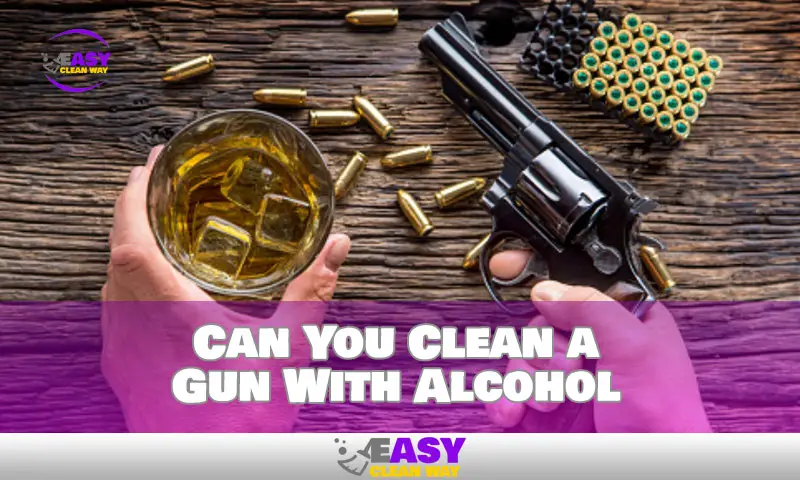Are you in the market for gun-cleaning solutions but don’t know which one to choose? If you’ve already heard of cleaning a gun with alcohol, you may be wondering if it’s safe and effective.
The short answer is that cleaning a gun with alcohol isn’t the best option. It can weaken or dissolve some finishes, and it evaporates too quickly to be effective on internal parts. Plus, it can be dangerous if you don’t take the proper safety precautions.
So what are your options? I’m here to explore all sides of this topic-—from traditional gun-cleaning methods and modern solutions, to DIY recipes and speciality tools—so you can make an informed decision about how to clean your firearms. Let’s dive in!
Types of Gun Cleaning Liquids
When it comes to cleaning your gun, there are a few different types of liquids you can use. Depending on the type of dirty you are dealing with, it’s important to choose the right type of liquid that can help get your gun back to top form.
One liquid you can use is rubbing alcohol. It’s great for cleaning off small areas and removing dirt and grime from the exterior of guns. Plus, it evaporates quickly once applied, so no extra wiping is necessary to get your gun looking its best.
Another type of liquid is alcohol-based gun cleaner. This stuff quickly cuts through fouling and residue, which makes it ideal for removing stubborn patches or spots on guns safely and effectively.
Lastly, don’t forget that long before modern gun cleaning solvents came onto the scene, folks were actually using alcohol as a solvent for gun cleaning! So if wiping down the outside of your weapon isn’t enough, try using an alcohol-based solvent like denatured ethanol to get that stuck-on buildup off your gun barrels and chambers.
Advantages and Disadvantages of Using Alcohol
If you’re considering cleaning your gun with alcohol, it pays to know both the pros and cons. After all, you want to make sure that whatever cleaning method you use is safe for your gun.
Alcohol has some advantages—it’s hygroscopic, meaning that it can dissolve materials from surfaces easily. It can also be used as a disinfectant because it kills some bacteria and viruses.
On the other hand, using alcohol may not always be the best choice for cleaning a gun. Alcohol is hygroscopic and therefore attracts moisture, which can lead to rust formation on the firearm if not completely evaporated. Additionally, normal ethanol (as opposed to isopropyl alcohol) does not evaporate quickly enough and may leave a residue on the gun’s surface. For these reasons, Isopropyl alcohol is generally recommended for cleaning electronics as it evaporates more rapidly than ethanol. To effectively kill bacteria and viruses with either ethanol or Isopropyl alcohol on surfaces, they both should be at 40-60% concentrations.
How to Safely Use Alcohol on Steel Parts
When it comes to using alcohol on a gun, it’s important to know that you should never use it on wooden parts because it can damage them. However, it can be used safely on steel parts.
The recommended alcohol for gun cleaning is 70% Isopropyl Alcohol (rubbing alcohol). It works great for sanitizing metal parts of stage weapons and has been used for decades by professional gunsmiths to clean and degrease metal parts with blued, parkerized, and plated finishes. It’s also great for cleaning and prepping surfaces that are dirty while leaving little to no residue.
To use Isopropyl Alcohol in your gun cleaning process, first make sure that the area is well-ventilated and the weapon is unloaded. Then, use a cloth or Q-tip soaked in the rubbing alcohol to swab off dirt particles, grime or any other residue that be present on the surface of the gun. When you’re done cleaning your weapon with Isopropyl Alcohol, remember to apply a thin layer of oil as wiping down guns with just alcohol can cause rusting over time due to its drying properties.
Possible Cleansers Other Than Alcohol
When it comes to cleaning a gun, you might think that alcohol is the only option — but there are actually several safe alternatives to consider. While isopropyl alcohol is common and safe to use on guns, if you’re looking for something a bit more specialized there are some great options available.
Degreasing
For degreasing metal parts, you can use acetone, denatured alcohol, or brake parts cleaner. All of these options are meant for cleaning metal surfaces and do a great job at removing grease and dirt particles.
Spraying the Action
If you need to spray down the action of your gun then an action cleaning solvent like CLP or another type of spray is the way to go. This type of solvent is specifically designed for cleaning off and protecting firearms, so it will do a good job at removing dirt and grime while also keeping your gun lubricated.
So while alcohol can work just fine when it comes to cleaning guns, there are other options out there that may be better suited for you depending on your needs. If you want something that can help degrease metal parts or spray down an action, just remember that there’s more than one way to clean your firearm safely!
Red Flags to Watch Out for During Gun Cleaning
There are a few warning signs you should look out for when cleaning your pistol in terms of gun safety. First off, it is not advised to clean a gun with alcohol because doing so could harm the weapon and decrease its accuracy. Any kind of solvent can thin out the firearm’s coating, making rust and corrosion more likely to occur. Moreover, prolonged solvent usage might weaken any parts made of hardened steel.
Another thing to keep in mind is that carrying firearms and ammunition in checked baggage is subject to complicated airline regulations. Law enforcement may also apply red flag legislation when a person poses a serious risk of using a firearm in a crime. It’s crucial to thoroughly understand the regulations in your state so you are aware of your rights and obligations when using a firearm or ammunition.
Finally, even if you believe the gun is empty, always remember never to clean your firearms while they are loaded! In order to keep safe and in line with the law, it’s crucial to be aware of these warning signs when cleaning and handling processes are being performed.
Common Mistakes to Avoid When Cleaning Guns With Alcohol
An important thing to remember about cleaning guns with alcohol is that it’s not always the safest option. While it’s helpful for removing all the oils from the gun, you should never use alcohol, over-the-counter solvents, or strong detergents to clean guns.
Oils
Alcohol strips away necessary lubricating and protective oils. Strong detergents can also strip away all the protective and lubricants from a gun. This will eventually lead to wear on the metal parts of your gun and harm the rifling of your barrel.
Mixing Chemicals
Mixing rubbing alcohol with bleach isn’t always recommended because of potential health risks due to chemical reactions, leading to toxic fumes and other potential injury risks.
Excessive Cleaning
Finally, avoid excessive cleaning with alcohol as it can possibly cause corrosion of metals over time. Make sure you are using just enough to clean off any dirt or grime that are on your gun safely and gently!
People Also Like: How to Clean Reusable Cotton Rounds
Conclusion
Ultimately, when it comes to cleaning a gun with alcohol, it is not the ideal choice. Though alcohol does make a great option for some quick, short-term cleanings, it is not the best for a long-term cleaning. It is best to use a gun solvent or other cleaner that is specifically designed for gun cleaning. This way, you can be sure that your gun is being cleaned properly and is safe to use. The bottom line is, alcohol can be used if you are in a pinch, but if you are looking for a more reliable and thorough cleaning option, you are better off using a gun cleaning solvent.
Hey there! I’m Alton Smith, your Clean Expert blogger. I’m on a quest to help you conquer chaos and embrace the joys of a tidy life.





